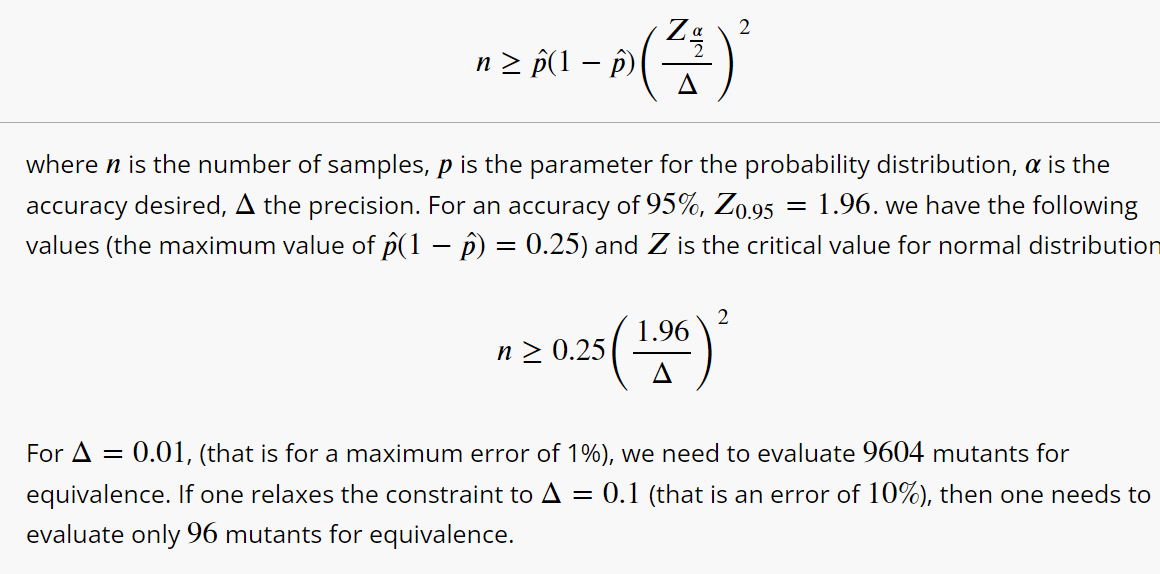NoteBook阅读
Mutation Analyze
关于ast–Abstract Syntax Trees 可算是找到一篇讲的非常清楚的博客了. 看了之后自己又调试了一遍代码,清楚多了
https://www.cnblogs.com/qiulinzhang/p/14258626.html
清楚这个之后,再去搞清楚这一小节写的代码逻辑,想必应该要轻松不少了.
7 A Simple mutator for Function
总算搞清楚这个代码的逻辑了
第一开始初始化的时候,并没有直接修改源代码,只是做了一个统计. 看一下需要变异的节点有多少个
后面provoke generate_mutant函数将location传递进来的时候才会发生突变. 换句话说, 这个location的具体含义是要在第几个变异节点发生变异
在 generate_mutant函数中
mutant_ast = self.pm.mutator_object(location).visit(ast.parse(self.pm.src)) # copy中的ast.parse(self.pm.src)就是每一次都把源代码解析的ast对象传递进去, 目的就是为了控制变量. 这样就能获取到每一个单个突变位置的突变. 最后再利用diff库中的函数进行与原始版本的比较.
作者把类中的函数分开来讲解,确实在对单个函数的说明上起到了一定的作用.但是对于类整体的功能理解上, 还是有一定的影响
我把单独的代码整合到了一起去看代码的逻辑, 终于清晰了不少
整合代码
class MuFunctionAnalyzer:
def __iter__(self):
print("__iter__")
return PMIterator(self)
def __init__(self, fn, log=False):
self.fn = fn
self.name = fn.__name__
src = inspect.getsource(fn) # 获取源码
self.ast = ast.parse(src)
self.src = ast.unparse(self.ast) # normalize
self.mutator = self.mutator_object()
self.nmutations = self.get_mutation_count()
self.un_detected = set()
self.mutants = []
self.log = log
def mutator_object(self, locations=None):
return StmtDeletionMutator(locations)
def register(self, m):
self.mutants.append(m)
def finish(self):
pass
def get_mutation_count(self):
self.mutator.visit(self.ast)
return self.mutator.count
class StmtDeletionMutator(ast.NodeTransformer):
def __init__(self, mutate_location=-1):
self.count = 0
self.mutate_location = mutate_location
def mutation_visit(self, node): return ast.Pass()
def mutable_visit(self, node):
self.count += 1 # statements start at line no 1
if self.count == self.mutate_location:
print("进行替换")
return self.mutation_visit(node)
return self.generic_visit(node)
def visit_Return(self, node):
print("visit_Return")
return self.mutable_visit(node)
def visit_Delete(self, node): return self.mutable_visit(node)
def visit_Assign(self, node): return self.mutable_visit(node)
def visit_AnnAssign(self, node): return self.mutable_visit(node)
def visit_AugAssign(self, node): return self.mutable_visit(node)
def visit_Raise(self, node): return self.mutable_visit(node)
def visit_Assert(self, node): return self.mutable_visit(node)
def visit_Global(self, node): return self.mutable_visit(node)
def visit_Nonlocal(self, node): return self.mutable_visit(node)
def visit_Expr(self, node): return self.mutable_visit(node)
def visit_Pass(self, node): return self.mutable_visit(node)
def visit_Break(self, node): return self.mutable_visit(node)
def visit_Continue(self, node): return self.mutable_visit(node)
class PMIterator(PMIterator):
def __init__(self, pm):
self.pm = pm
self.idx = 0
def __next__(self):
i = self.idx
if i >= self.pm.nmutations:
self.pm.finish()
raise StopIteration()
self.idx += 1
mutant = Mutant(self.pm, self.idx, log=self.pm.log)
self.pm.register(mutant)
return mutant
class Mutant:
def __init__(self, pm, location, log=False):
self.pm = pm
#print(pm)
self.i = location
self.name = "%s_%s" % (self.pm.name, self.i)
self._src = None
self.tests = []
self.detected = False
self.log = log
def generate_mutant(self, location):
mutant_ast = self.pm.mutator_object(
location).visit(ast.parse(self.pm.src)) # copy
return ast.unparse(mutant_ast)
def src(self):
if self._src is None:
self._src = self.generate_mutant(self.i)
return self._src
def diff(self):
return '\n'.join(difflib.unified_diff(self.pm.src.split('\n'),
self.src().split('\n'),
fromfile='original',
tofile='mutant',
n=3)) 下面是运行代码, 还有一些解释性的语句, 自认为已经比较清楚了.
运行代码
test = MuFunctionAnalyzer(triangle)
print("test.nmutations:",test.nmutations)
for m in test:
print("=======这是第%d次变异====================" % m.i)
print("原始代码:")
print(mutant.pm.src)
print("在固定节点变异之后的代码")
print(m.src())
print("========================================\n")
===================================================================================
运行结果:
visit_Return
visit_Return
visit_Return
visit_Return
visit_Return
test.nmutations: 5
__iter__
=======这是第1次变异====================
原始代码:
def triangle(a, b, c):
if a == b:
if b == c:
return 'Equilateral'
else:
return 'Isosceles'
elif b == c:
return 'Isosceles'
elif a == c:
return 'Isosceles'
else:
return 'Scalene'
在固定节点变异之后的代码
visit_Return
进行替换
visit_Return
visit_Return
visit_Return
visit_Return
def triangle(a, b, c):
if a == b:
if b == c:
pass
else:
return 'Isosceles'
elif b == c:
return 'Isosceles'
elif a == c:
return 'Isosceles'
else:
return 'Scalene'
========================================
=======这是第2次变异====================
原始代码:
def triangle(a, b, c):
if a == b:
if b == c:
return 'Equilateral'
else:
return 'Isosceles'
elif b == c:
return 'Isosceles'
elif a == c:
return 'Isosceles'
else:
return 'Scalene'
在固定节点变异之后的代码
visit_Return
visit_Return
进行替换
visit_Return
visit_Return
visit_Return
def triangle(a, b, c):
if a == b:
if b == c:
return 'Equilateral'
else:
pass
elif b == c:
return 'Isosceles'
elif a == c:
return 'Isosceles'
else:
return 'Scalene'
========================================
=======这是第3次变异====================
原始代码:
def triangle(a, b, c):
if a == b:
if b == c:
return 'Equilateral'
else:
return 'Isosceles'
elif b == c:
return 'Isosceles'
elif a == c:
return 'Isosceles'
else:
return 'Scalene'
在固定节点变异之后的代码
visit_Return
visit_Return
visit_Return
进行替换
visit_Return
visit_Return
def triangle(a, b, c):
if a == b:
if b == c:
return 'Equilateral'
else:
return 'Isosceles'
elif b == c:
pass
elif a == c:
return 'Isosceles'
else:
return 'Scalene'
========================================
=======这是第4次变异====================
原始代码:
def triangle(a, b, c):
if a == b:
if b == c:
return 'Equilateral'
else:
return 'Isosceles'
elif b == c:
return 'Isosceles'
elif a == c:
return 'Isosceles'
else:
return 'Scalene'
在固定节点变异之后的代码
visit_Return
visit_Return
visit_Return
visit_Return
进行替换
visit_Return
def triangle(a, b, c):
if a == b:
if b == c:
return 'Equilateral'
else:
return 'Isosceles'
elif b == c:
return 'Isosceles'
elif a == c:
pass
else:
return 'Scalene'
========================================
=======这是第5次变异====================
原始代码:
def triangle(a, b, c):
if a == b:
if b == c:
return 'Equilateral'
else:
return 'Isosceles'
elif b == c:
return 'Isosceles'
elif a == c:
return 'Isosceles'
else:
return 'Scalene'
在固定节点变异之后的代码
visit_Return
visit_Return
visit_Return
visit_Return
visit_Return
进行替换
def triangle(a, b, c):
if a == b:
if b == c:
return 'Equilateral'
else:
return 'Isosceles'
elif b == c:
return 'Isosceles'
elif a == c:
return 'Isosceles'
else:
pass
========================================
-----------------------------------8 Evaluating Mutations
涉及到了两个函数
__enter__():The enter() function is called when the with block is entered. It creates the mutant as a Python function and places it in the global namespace, such that the assert statement executes the mutated function rather than the original.def __enter__(self): if self.log: print('->\t%s' % self.name) c = compile(self.src(), '<mutant>', 'exec') eval(c, globals()) # 创建全局的变量__exit__():The exit() function checks whether an exception has occurred (i.e., the assertion failed, or some other error was raised); if so, it marks the mutation as detected. Finally, it restores the original function definition.def __exit__(self, exc_type, exc_value, traceback): if self.log: print('<-\t%s' % self.name) if exc_type is not None: self.detected = True if self.log: print("Detected %s" % self.name, exc_type, exc_value) globals()[self.pm.name] = self.pm.fn # 因为突变把原来函数给改变了嘛,所以后面又重新把它恢复成原来的样子了 if self.log: print() return True
其他的倒是不难理解了
9 Mutator for Modules and Test Suites
问题:
self.mutator.visit(self.ast)这个函数调用的是AdvMutator里面mutable_visit函数???? 为什么会是这样呢?A: 你懵了吗, 之前不是探讨过这个问题吗. 并不是self.mutator.visit(self.ast)调用的这个函数, 而是其调用的函数调用的.
def visit(self, node): """Visit a node.""" method = 'visit_' + node.__class__.__name__ visitor = getattr(self, method, self.generic_visit) # 这个函数先访问你自定义的节点visit方法, # 如果没有的话, 就递归访问子节点, # 也就是说, 是你自定义的节点visit_XXXX方法调用的mutable_visit. # 你可以再去看看上面 return visitor(node)__dict__在py中,到底起什么样的作用呢? 为什么这个可以实现全局调用?A: Python 类提供了 dict 属性。需要注意的一点是,该属性可以用类名或者类的实例对象来调用,用类名直接调用 __dict__,会输出该由类中所有类属性组成的字典;而使用类的实例对象调用 __dict__,会输出由类中所有实例属性组成的字典。
runtest函数中细节还要再理解
A: 是unittest类里面的内容, 下次的时候可以再去百度看.
再了解一下unittest
A: 就是一个测试类, 也记不住, 下次用到在百度看把
合成代码
按照我的理解的话, 这一小节的内容, 就是为了把第8小节中的变异之后函数运行问题做了简化, 其实本质上还是之前的内容. 过程中用到了
unittest这个模块
还是一样的做法, 把代码们先弄到一起
class MuProgramAnalyzer(MuFunctionAnalyzer):
def __iter__(self):
return AdvPMIterator(self)
def __init__(self, name, src):
self.name = name
self.ast = ast.parse(src)
self.src = ast.unparse(self.ast)
self.changes = []
self.mutator = self.mutator_object()
self.nmutations = self.get_mutation_count()
self.un_detected = set()
def mutator_object(self, locations=None):
return AdvStmtDeletionMutator(self, locations)
def get_mutation_count(self):s
self.mutator.visit(self.ast) # 这个函数调用的是AdvMutator里面mutable_visit函数???? 为什么会是这样呢?
return self.mutator.count
class AdvMutator(Mutator):
def __init__(self, analyzer, mutate_locations=None):
self.count = 0
self.mutate_locations = [] if mutate_locations is None else mutate_locations
self.pm = analyzer
def mutable_visit(self, node):
self.count += 1 # statements start at line no 1
return self.mutation_visit(node)
class AdvStmtDeletionMutator(AdvMutator, StmtDeletionMutator):
def __init__(self, analyzer, mutate_locations=None):
AdvMutator.__init__(self, analyzer, mutate_locations)
def mutation_visit(self, node):
index = 0 # there is only one way to delete a statement -- replace it by pass
if not self.mutate_locations: # counting pass
self.pm.changes.append((self.count, index))
return self.generic_visit(node)
else:
# get matching changes for this pass
mutating_lines = set((count, idx)
for (count, idx) in self.mutate_locations)
if (self.count, index) in mutating_lines:
return ast.Pass()
else:
return self.generic_visit(node)
class AdvPMIterator:
def __init__(self, pm):
self.pm = pm
self.idx = 0
def __next__(self):
i = self.idx
if i >= len(self.pm.changes):
raise StopIteration()
self.idx += 1
# there could be multiple changes in one mutant
print(self.pm.changes)#
return AdvMutant(self.pm, [self.pm.changes[i]])
class AdvMutant(Mutant):
def __init__(self, pm, locations):
self.pm = pm
self.i = locations
self.name = "%s_%s" % (self.pm.name,
'_'.join([str(i) for i in self.i]))
self._src = None
def __getitem__(self, test_module):
test_module.__dict__[
self.pm.name] = import_code(
self.src(), self.pm.name)
return MutantTestRunner(self, test_module)
def generate_mutant(self, locations):
mutant_ast = self.pm.mutator_object(
locations).visit(ast.parse(self.pm.src)) # copy
return ast.unparse(mutant_ast)
def src(self):
if self._src is None:
self._src = self.generate_mutant(self.i)
return self._src
class MutantTestRunner:
def __init__(self, mutant, test_module):
self.mutant = mutant
self.tm = test_module
def runTest(self, tc):
suite = unittest.TestSuite()
test_class = self.tm.__dict__[tc]
for f in test_class.__dict__:
if f.startswith('test_'):
suite.addTest(test_class(f))
runner = unittest.TextTestRunner(verbosity=0, failfast=True)
try:
with ExpectTimeout(1):
res = runner.run(suite)
if res.wasSuccessful():
self.mutant.pm.un_detected.add(self)
return res
except SyntaxError:
print('Syntax Error (%s)' % self.mutant.name)
return None
raise Exception('Unhandled exception during test execution')
10 The Problem of Equivalent Mutants
在替换的过程中, 有可能会产生这种情况: 替换过后相当于没有替换. 并不会产生错误. 替换掉了一个无关紧要的语句. 把这种情况称为equivalent mutants
要解决这个问题, 文章中说了两个方法
10.1 Statistical Estimation of Number of Equivalent Mutants
利用正态分布

10.2 Statistical Estimation of the Number of Immortals by Chao’s Estimator

Note that these immortal mutants are somewhat different from the traditional equivalent mutants in that the mortality depends on the oracle used to distinguish variant behavior. That is, if one uses a fuzzer that relies on errors thrown to detect killing, it will not detect mutants that produce different output but does not throw an error. Hence, the Chao1 estimate will essentially be the asymptote value of mutants the fuzzer can detect if it is given an infinite amount of time.
Synopsis
This chapter introduces two methods of running mutation analysis on subject programs. The first class MuFunctionAnalyzer targets individual functions. Given a function gcd and two test cases evaluate, one can run mutation analysis on the test cases as follows —第7小节
The second class MuProgramAnalyzer targets standalone programs with test suites. Given a program gcd whose source code is provided in gcd_src and the test suite is provided by TestGCD, one can evaluate the mutation score of TestGCD as follows
个人感觉这两种方式的差距, 并没有很大. 甚至好像没什么区别-可能是我菜吧😥-🤣
The mutation score thus obtained is a better indicator of the quality of a given test suite than pure coverage.
Lessons Learned
为什么做这个, 怎么做, 这种方法有什么局限.又应该怎么改进.
不得不说,作者的思路真的很清晰了.
- We have learned why structural coverage is insufficient to evaluate the quality of test suites.
- We have learned how to use Mutation Analysis for evaluating test suite quality.
- We have learned the limitations of Mutation Analysis – Equivalent and Redundant mutants, and how to estimate them.

